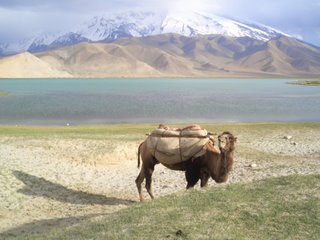
Day 18 (August 6th)
An uneventful day spent mostly on the 23-hour train ride to Kashgar, sleeping, reading, and talking to the Pakistani medical students who were in the same sleeping compartment.
Day 19 - Kashgar
Spending time in Kashgar, more than any other place I've seen in Xinjiang, feels like stepping out of China completely. Most of the Chinese I do see seem to be tourists themselves, and it is almost completely Uyghur in character. It is the city farthest west in China and keeping official Beijing time feels the most bizarre, as it is daylight until at least 9:30pm. Kashgar was once an important city along the Silk Road, and is still a place of trading and markets.
Besides its famous Sunday Market there isn't much in the way of "sights" in Kashgar, so the city itself is the attraction. The streets in and around the Old City and Id Kah mosque are lined with fruit stands, kebab houses, and shops selling distinctly Uyghur goods such as instruments, decorative knives, hats, and rugs. Headless, skinned animals hang outside meat shops, and young boys walk the streets with baskets of bread balanced on their heads. Besides the lamb kebabs and other foods I am familiar with from the Xinjiang presence in Zhangye, there are a variety of new dishes being sold on the street that I haven't always been able to identify (or necessarily recommend).
People watching is fascinating. The young girls wear scarves covering their hair and traditional dresses, while some of the traditional older woman are covered from head to toe and have black veils that hide even their eyes. The men wear the round hats that are a familiar sight among Muslims in China, and some of the old men have the most fantastic beards. It seems even the people selling fruit in the street sometimes don't know so much as numbers in Chinese, so the language barrier is bigger here. As another English teacher who's been in China one and a half years said, "I've experienced culture shock coming to Xinjiang". In a way, it's a little refreshing to get no reaction to my Chinese, rather than the gushing Chinese compliments that can feel patronizing.
For lunch on the first day in Kashgar, I tried a second-floor restaurant on the square with the mosque. The waitress there was fascinating to watch, an unnaturally tall and thin young woman who ran/slid around the busy place in her sandals and Uyghur dress. She knew English, but didn't so much speak it as shot it out like ammunition: "Sorry! I am late!". During the day I attracted the attention of 3 different eager English speaking Uyghurs looking for conversation: a man running an instrument store, a man selling socks from a push-cart, and a teacher from Urumqi named Kurban ("You know Kurt Kurban? Nirvana? He is a good singer"). Mohammed, the man selling instruments, told me of his wish to visit Africa: "I met a black-skinned person the other day. They are very interesting! I pinched his arm, and I wanted to know if his blood was red or was it also black. If a black-skinned person opened a shop here, it would be very popular, because everyone would want to look at him." He was fascinated to hear that I had "black-skinned people" with me at school, and that sometimes they marry white people.
For a late dinner I visited the popular night market that is also near the mosque, where the end of a street becomes flooded with pedestrians and stalls selling various fried foods, fish and meat dishes, glasses of colorful drinks filled from fountain-equipped carts, and the ever-present lamb kebabs. I sampled some foods I had never seen before, which were mostly good, though I decided to pass on the full sheep's head.
Day 20
I had made the decision to stay in Kashgar about a week and relax, and on my second day I had no plans or ambitions whatsoever. As it is put in Office Space, "I did nothing, and it was everything I hoped it could be". The highlight of the day was going to the park for a few hours, surrounded by local families and young couples who hung out on carpets and played cards or songs on the
dutar, the two-stringed instrument my friend Aqbar would play in Zhangye. The largest Chinese presence in Kashgar is in the official names of things: "People's Park" runs south of "People's Road", and is to the east of "Liberation Road". In a square to the north of the park is a bizarre spectacle: one of the largest Mao Zedong statues in China, with a confident arm outstretched and rows of Chinese flags to either side. I suppose it's Beijing's reminder of who really controls the area.
At night I went back to the same market, where the stalls were different and I was tempted by the huge legs of lamb. It was rubbery and revolting, but was worth a try. Better were the lamb kebabs from a restaurant on that street, where there were tables outside that were actually beds with a small table in the middle, where you could take off your shoes and sit comfortably while having some tea and kebabs. There were many places like this in Turkey. It's incredibly relaxing, and I'm not sure why it hasn't caught on in America.
Day 21
I set out on bicycle for several hours, passing through the streets I had already explored before continuing on to the famed Sunday Market area. It was Wednesday, but the market is there everyday and I thought I'd see it first in its tamer guise. Apparently, about 50,000 extra people flood Kashgar each Sunday for the market. I was reminded of the Grand Bazaar in Istanbul - it was indoors, and a maze of alleyways wound past stalls with jewelry, carpets, instruments, or simply bicycle tires and car parts. The place was lazy and without many people, and the vendors lacked the usual enthusiasm to shout "hello!" as soon as they saw a Western tourist.
I also visited a Uyghur crafts store, a high-class place with hand-made jade figures and various jewelry. The prices were shocking, with many larger pieces going for well over my year's salary, and I wasn't really planning on buying anything anyway, but I figured I'd take a look at what they had in my price range. They had to pull out a special bottom-of-the-barrel box from behind the counter with assorted small pieces of carved, impure jade. They had figures of the 12 animals in the Chinese Zodiac, so I took a look at mine, the glorious pig. It was a small but nice enough figure, which they quoted the price 220 yuan for. I slowly worked them down, and the mood changed when I told them I was an English teacher in Gansu province, so I bought it for 80 yuan. I don't know what a fair price was and I was just mildly interested, but the bargaining success was fun in itself.
While browsing a store near the mosque and admiring its painted tamborines, I got into conversation with the man working there, a middle-school English teacher who helps out at his brother's store during the summer. As so many random people have here, he had a Gansu connection, having gone to college in the city of Lanzhou, so my job was again an in into a good conversation. His name was Waili (sounds like "Vie-lee"), and we hung out talking for a while as I tried different Uyghur instruments, all made by his family of 8 siblings. He talked fondly of his foreign teachers from university, and obviously missed the chance to speak English with foreigners.
Day 22
I took a day-and-a-half break from Kashgar to visit Karakul Lake, about fours hours away by bus along a scenic mountain highway. This was the last of the three famous mountain lakes in Xinjiang, and became my favorite. I had heard rumours of the road being washed away in parts, but didn't bother much about them. Sure enough, about a half-hour away from the lake the bus stopped, and what little traffic there was became backed up. One of the other foreign travelers joked that we should just walk - it would only be two or three hours. As luck would have it, we sat around not moving or knowing what was going on for a full four hours. We should have walked. So, the four hour journey became eight hours, and I was reminded how much I enjoy trains.
Surprisingly, there were very few tourists at the lake, nothing even beginning to approach the numbers at Tianchi and Kanas Lake. The area of the lake itself is small, but I appreciated that it involved neither a long uphill climb or trekking over a large spread-out area. I also thought it was the most breathtaking of the three lakes, indeed it was spectacular, and I would challenge any artist in the world to create a more beautiful landscape. There was complete silence, and I stared alone at the snowy, cloud-capped mountain that is the centerpiece with a feeling of enormous well-being. Because of the late arrival there was no time to try climbing up any of the mountains on the other side, so I decided to just make a circuit of the lake. This was harder than expected - probably because of the recent bad weather, a tiny but challenging river snaked across my path about a quarter of the way around. I found a place to cross, but the land became more and more like a swamp as went along. I was sure I would find enough footholds to complete the journey and pressed on, but after an hour there was simply too much water to go any further, and I retraced my steps in defeat.
Like at Tianchi I stayed overnight in a yurt owned by herders, this time a Khyrgyzh family rather than Khazahks. I was the lone boarder at that yurt and they spoke about 10 words of English ("noodles!" was the enthusiastic announcement for dinner) and no Chinese, so it was a more idyllic and romantic yurt experience than the backpacker hangout at Tianchi. I became very curious about the lives of these people - funny-hat wearing Manas, his pleasant round-faced wife Wuljun, and child Mustapa, who had learned to say "Hello!" and made damn sure I didn't forget it. There were no books, instruments, or anything that didn't directly have to do with surviving, and I'm curious what they do with their days. I tried to get answers from a young friend of theirs who came in and spoke some English, and he said his interests were "business", which I gathered from his constant attempts to sell me anything from a hat to a motorcycle ride.
Around 3am I snuck out of the yurt to use the bathroom, and the grey-washed scenery at the time was so surreal and otherworldly that I won't soon forget it.
Day 23
For breakfast Wuljun served some bread and milk tea, and the three of them watched everything I did with curiosity, and casually looked through my notebook and possessions. They were an especially attentive audience when I put in my contact lenses. I wished I had brought postcards or something of interest from the outside world for them, and I decided to leave them a photocopy from my Chinese textbook, which fascinated them. I very easily flagged down a bus to Kashgar on the side of the road, and we waited merely one hour on the return journey. Besides terrible 80's music videos they showed Mr. Bean, which brought a broad smile to my face. I shudder at most of the Western culture the Chinese have imported and are forming their ideas about us on (The Backstreet Boys being by far one of the best known), so it pleasing to know Mr. Bean is available dubbed in Uyghur and sub-titled in Chinese.
Waili, the Uyghur man I met at his brother's store, had wanted me to stop by again and possibly go out for some drinks, so I decided to take him up on the opportunity. Chance encounters like this with local insiders are one of the best results of hanging a place with no rigid schedule. First we went to a night market for a few kebabs and beers, as it was still evening and the bars would also be much more expensive. He showed me the Uyghur style of drinking, in which one person alone has a full glass, and while they are drinking it is their turn to carry the conversation, until they finish and the next person drinks solo and talks. I also learned cheers in Uyghur (something like "huoshe") and a drinking game in which tiger beats chicken, chicken beats insects, insects beat stick, and the stick beats the tiger. He had a little of funny and interesting things to say, such as the time he had dinner with one of his foreign teachers, a tall and overweight American woman. He was amazed at the amount of food and beer she could handle, and not knowing the word for "appetite", he blurted out "you really have a big belly!" and couldn't understand why she got angry. He clearly admired America, such as its principles on human rights and freedom of speech. The people of Xinjiang are different in every way from the Chinese and don't necessarily love being ruled by them, something I finally got the chance to ask a local about. He was also fascinated by the strange things Americans do - "I read about a kissing contest, and the winning couple kissed for 30 hours! It went right into Guinness World Records." When it was time to head to a bar, he asked if I wanted to see a Chinese or a Uyghur bar. The difference? "Different music, and in a Uyghur bar there are only Uyghur people; in a Chinese bar only Chinese people go." He also wanted to know if I wanted to the best bar, or to a cheap bar where people get in fights.
I have no doubt the bar we went to must have been the best Uyghur bar in Kashgar. There were two uniformed staff to greet us at the entrance, and waiters in bow ties served tables inside. A typical large bottle of beer in China from the store costs 2 or 3 yuan; here there was a 30 yuan spending minimum per person. A bowl of popcorn was 10, and small foreign beers 18 each. There were two floors, with the second floor balcony looking out over the large dance floor. The music was all Uyghur, and there were not but one a series of live singers, and two separate solo dance performances from beautifully dressed girls that were nothing short of mesmerizing. The Uyghur people have dancing in their blood, and they had a funny way of doing it at a club - everyone would converge on the dance floor simultaneously, and leave it just as quickly when the song ended. I couldn't tell the difference between the songs meant for dancing and the ones meant for sitting and talking.
At the table next to us were four girls, who would dance in pairs during the appropriate songs. One of them was absolutely, unbelievably beautiful, far and away the most attractive in the building. Feeling an unusual confidence that could only come with a mix of beer and being in a foreign country, I asked Waili to ask her to dance with me, relieved that not knowing the language allowed me to put the task to someone else. But he was no braver than I was, saying "I don't know, I'm too shy!" After a few songs he went over and asked, showing his head with disappointment as he returned to our table. Perhaps she was unimpressed with my shabby jeans and a t-shirt that now had an unmissable stain from eating kebabs.
After a while Waili convinced me that we should get on the dance floor during an upbeat song, so I tried to follow what he was doing and was glad that the Uyghurs don't stare at foreigners anywhere near as much as the Chinese. And it didn't go half as badly as expected, at least according to my judgement at the time. Waili less-than-subtlely drew us nearer to the four dancing girls, and they acknowledged us with knowing smiles as they continually floated away. During the next dance song they softened, and we ended in a circle of five with one of the girls dancing in the middle and smiling at everyone in turn. This was immediately followed by a slow song, and to my surprise the center of the circle lingered and then began dancing with me. It wasn't the Aphrodite, but I suddenly realized how attractive she was in her own right. I began by making an ass of myself and putting my arms in the wrong position, which she had to correct, and I was probably a less than inspiring dance partner after going so long without a slow dance. I noticed Waili dancing with the girl I had my eyes on all along, which was cut short because he left to greet a friend who had phoned and wanted to meet him at the bar.
His friend was a timid, pretty girl who was apparently a doctor, which may have been a mistranslation considering how young she looked. She said almost nothing and ordered a soft drink, and then wanted to leave after about 20 minutes. I was of the mind to stay, so I let the two of them leave first. During the next available song I asked the girl at the next table to dance with a gesture towards the dance floor, but she shook her head and waved her hands "no" with a little more emphasis than was necessary, pointing towards her friends as explanation as she accompanied them to dance. I'd like to think it was because she was truly unable to leave her friend without a dance partner, and not because our dance had been that traumatic an experience. At any rate, a fun and unexpected night out in high-class Kashgar.
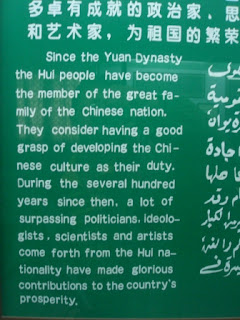 And of the many pictures chosen to represent Hui culture, my favorite was definitely this one:
And of the many pictures chosen to represent Hui culture, my favorite was definitely this one:
 And of the many pictures chosen to represent Hui culture, my favorite was definitely this one:
And of the many pictures chosen to represent Hui culture, my favorite was definitely this one:





 When we returned to Xining I was still ill and needed a day to recover, and since we didn't arrive early enough for the day trip we had planned anyway it became a day of rest. The next day was set aside for Qinghai Lake (青海湖), probably the best known attraction of Qinghai Province. It is the largest lake in China and features blue, unpolluted water and the aptly named Bird Island, which has... lots of birds.
When we returned to Xining I was still ill and needed a day to recover, and since we didn't arrive early enough for the day trip we had planned anyway it became a day of rest. The next day was set aside for Qinghai Lake (青海湖), probably the best known attraction of Qinghai Province. It is the largest lake in China and features blue, unpolluted water and the aptly named Bird Island, which has... lots of birds.








 The temple was certainly a pleasant, atmospheric place, quieter and more enjoyable than the more famous Ta'er Si outside of Xining. The cliff sides towering over the building were bursting with colorful prayer flags, and the surrounding scenery was not half bad. The monks living and studying in the temple were a friendly and curious group. I guess it shouldn't be surprising but in general the monks we met on the trip were memorably hospitable and kind. There was only one monk who could speak good Chinese at the temple, and at around 24 was the oldest. After a number of years of studying Buddhism the monks would graduate and move on. They were not allowed to marry, and if they did they would have to permanently leave the order.
The temple was certainly a pleasant, atmospheric place, quieter and more enjoyable than the more famous Ta'er Si outside of Xining. The cliff sides towering over the building were bursting with colorful prayer flags, and the surrounding scenery was not half bad. The monks living and studying in the temple were a friendly and curious group. I guess it shouldn't be surprising but in general the monks we met on the trip were memorably hospitable and kind. There was only one monk who could speak good Chinese at the temple, and at around 24 was the oldest. After a number of years of studying Buddhism the monks would graduate and move on. They were not allowed to marry, and if they did they would have to permanently leave the order. After touring the modest temple we took a walk out into the surrounding countryside. The shy girl running a small store told us there was a primary school about a half-hour walk along the path, and we figured we'd see what was to be seen while we waited for the bus to return in the later afternoon. We did find the school, which was a poor, one-room schoolhouse with just one class of 50 students. The students were at different ages and levels, averaging around 8 or 9 years old, and there were only two teachers. The children poured out of the building after their lesson and took some long, curious looks at us, with a few of the braver ones coming up to say "hello". As with most of the area, they were all Tibetan.
After touring the modest temple we took a walk out into the surrounding countryside. The shy girl running a small store told us there was a primary school about a half-hour walk along the path, and we figured we'd see what was to be seen while we waited for the bus to return in the later afternoon. We did find the school, which was a poor, one-room schoolhouse with just one class of 50 students. The students were at different ages and levels, averaging around 8 or 9 years old, and there were only two teachers. The children poured out of the building after their lesson and took some long, curious looks at us, with a few of the braver ones coming up to say "hello". As with most of the area, they were all Tibetan.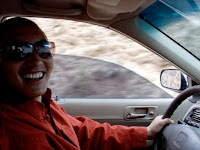 When we returned to the temple to wait for the bus, a monk who was driving into town offered us a ride in his car, which we gladly accepted. He went out of his way to show us a nearby cliff carving of a Buddha, and was quite a cool monk. He was very fond of Stephen's sunglasses which he was borrowing, and seemed to be dropping hints that he wouldn't mind if Stephen gave them to him, but Stephen hadn't brought them all the way from America just to make a monk in Qinghai stylish. The music selection of the day was Buddhist chanting. When he dropped us at our hotel we decided to give him some gas money as thanks. As it happened there was a 20 yuan bill laying on the ground just in front of us. We weren't quite sure where it came from, possibly falling out of one of our pockets, but we gave it to the monk, who declared "money from Heaven!"
When we returned to the temple to wait for the bus, a monk who was driving into town offered us a ride in his car, which we gladly accepted. He went out of his way to show us a nearby cliff carving of a Buddha, and was quite a cool monk. He was very fond of Stephen's sunglasses which he was borrowing, and seemed to be dropping hints that he wouldn't mind if Stephen gave them to him, but Stephen hadn't brought them all the way from America just to make a monk in Qinghai stylish. The music selection of the day was Buddhist chanting. When he dropped us at our hotel we decided to give him some gas money as thanks. As it happened there was a 20 yuan bill laying on the ground just in front of us. We weren't quite sure where it came from, possibly falling out of one of our pockets, but we gave it to the monk, who declared "money from Heaven!" That afternoon we went to the bus station to buy return tickets, and met one of the more colorful characters of the trip, a middle-aged Tibetan man whose English name was Jerry. Jerry dabbled in officialdom, selling pet food, history, amateur philosophizing, and heavy drinking. If he spoke English I think he would have used phrases like "now let me tell you something" a lot. He spoke quite fast and excitedly so mostly the only one who could keep up with his Chinese was Andrew, who Jerry was fond of hitting with the back of his hand when making an important point, at least once spraying the ashes of his cigarette all over Andrew's clothes. He was straight out of the movies, especially in his all-black outfit and sunglasses, and Stephen eventually caught on to his resemblance to Al Pacino.
That afternoon we went to the bus station to buy return tickets, and met one of the more colorful characters of the trip, a middle-aged Tibetan man whose English name was Jerry. Jerry dabbled in officialdom, selling pet food, history, amateur philosophizing, and heavy drinking. If he spoke English I think he would have used phrases like "now let me tell you something" a lot. He spoke quite fast and excitedly so mostly the only one who could keep up with his Chinese was Andrew, who Jerry was fond of hitting with the back of his hand when making an important point, at least once spraying the ashes of his cigarette all over Andrew's clothes. He was straight out of the movies, especially in his all-black outfit and sunglasses, and Stephen eventually caught on to his resemblance to Al Pacino.

 The impression of Yushu I had from my scant information proved to be accurate enough - a small, remote, and pleasant town with Tibetan characteristics. From the architecture to the hilltop temples and the huge (and I mean HUGE - take note of the bulldozer in the picture) statue of a legendary Tibetan warrior king, it had a refreshingly un-Chinese character. Like my travels through Xinjiang, there a slight feeling of not being in Kansas anymore.
The impression of Yushu I had from my scant information proved to be accurate enough - a small, remote, and pleasant town with Tibetan characteristics. From the architecture to the hilltop temples and the huge (and I mean HUGE - take note of the bulldozer in the picture) statue of a legendary Tibetan warrior king, it had a refreshingly un-Chinese character. Like my travels through Xinjiang, there a slight feeling of not being in Kansas anymore.



 "There was no good reason to go to Yulin and it took 10 hours to get there."
"There was no good reason to go to Yulin and it took 10 hours to get there."


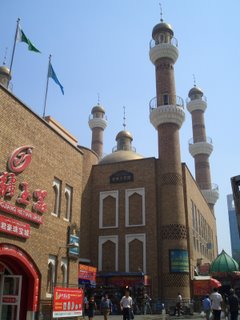 Day 30 (8/18) - Urumqi
Day 30 (8/18) - Urumqi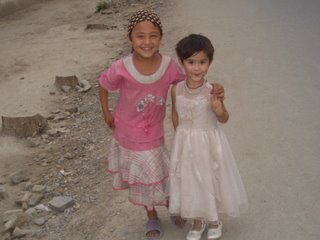 Day 26 (8/14) - Yarkand
Day 26 (8/14) - Yarkand Day 24 (8/12)
Day 24 (8/12) Day 18 (August 6th)
Day 18 (August 6th)